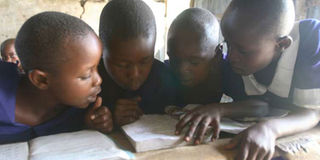Agency: Charge tutors, pupils for damaging books

Pupils in Karunga Primary School share a text book during a lesson on March 6, 2012. A report has recommended that teachers and pupils should be held responsible for damage or loss of books procured by the government. PHOTO | TOM OTIENO | NATION MEDIA GROUP
What you need to know:
- The September 2015 report, Examination into the Disbursement and Utilisation of Free Primary Education Funds, says contravention of the policy makes it difficult for schools to attain the optimum book-to-pupil ratio.
- The EACC investigators observed that records maintained for books issued to teachers and pupils in some schools did not capture details that could ensure accountability.
Teachers and pupils should be held responsible for damage or loss of books procured by the government, a report has recommended.
The report was handed over to Education Cabinet Secretary Fred Matiang’i on Wednesday by Ethics and Anti-Corruption Commission (EACC) Chief Executive Officer Halakhe Waqo.
It says a policy that requires those who lose or damage books to replace them was not being followed.
“Most schools visited were not implementing the policy as the team was informed that guardians and parents do not support replacement of lost or damaged books,” says the report.
The September 2015 report, Examination into the Disbursement and Utilisation of Free Primary Education Funds, says contravention of the policy makes it difficult for schools to attain the optimum book-to-pupil ratio.
It adds that in some cases, records of lost or damaged books are poorly maintained, making it difficult to establish the number of books lost or damaged.
The EACC investigators observed that records maintained for books issued to teachers and pupils in some schools did not capture details that could ensure accountability.
“In some schools, such records did not capture the name of the borrower, date of issue and return or number of copies borrowed. In some schools the borrowers did not even sign registers to confirm that the books were actually issued to them,” it says.
Most schools do not have stores though the government had released funds to build them.
“Some schools bought a wooden cupboard, which is maintained in headteachers' or deputy headteachers' offices,” the report says, adding that storage areas in many schools were disorganised.





